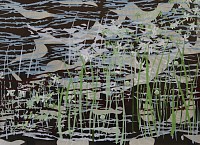BIOGRAPHY

ARABELLA CACCIA
Arabella was born in London and grew up in Tuscany before moving to Johannesburg where she spent her teenage years. She then went to Edinburgh University after which she lived and studied in Florence, London and New York. She returned to South Africa in 1990 and now lives and works in Cape Town.
Arabella draws inspiration from the people, places and objects she loves. From the light where she lives and the wilderness where she goes to find peace and silence. The feeling of quiet and perhaps stillness in the work reflects the ambience she creates around her, in order to find inspiration and access her creativity.
Arabella Caccia’s recent work is inspired by an exploration of patterns found in the play of light and dark on natural forms. Her paintings and sculptors use and abstract language of semi-symbolic glyphs discovered in these patterns. The primary principal underpinning her work is the belief in the importance of process.
Caccia’s paintings and sculptures use an alphabet of glyphs derived from an investigation into forms found in nature. Caccia uses an alphabet of both 2 and 3- dimensional mark making to express a state of being. Caccia stresses the importance of the creative process, which is expressed through performance work in collaboration with cellist Jessica Bailey, where painter and musician improvise together.
Caccia’s work has most recently found expression through the study of trees, first the Baobab tree studied in Botswana followed by work in the ancient Milkwood forests of the Western Cape and then the Tsitsikamma forest biome. Her exploration has included detailed drawings of plants and trees followed by a thorough investigation into the patterns created by the bark formations of various indigenous trees. Drawing, taking moulds and printing has lead to uncovering of an alphabet of glyphs which are found in all forms and which when further abstracted form a script like visual language. Caccia uses these universal forms to recreate two- and three-dimensional works that by their intrinsic universality aim to create experiences that echo those of nature herself.
By steeping herself in un spoiled expanses of the planet Caccia seeks to deepen her exploration into the plant kingdom, rock and land formations, and so refine and challenge the language and the expression of her work.
